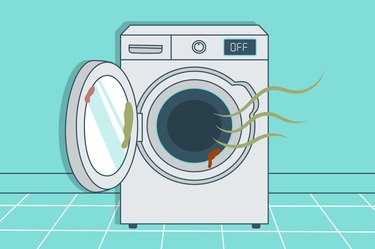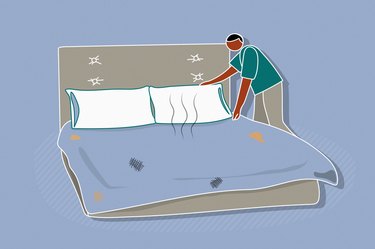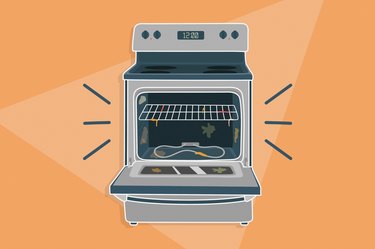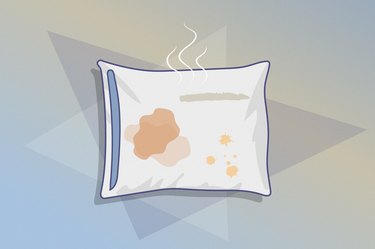
There's nothing like pulling a fresh load of laundry from the dryer — so clean, crisp and fragrant.
But what if we told you that your newly washed clothes and linens were likely dirtier now than before the suds session? Sadly, this is probably the case if you haven't cleaned your washing machine in a while.
Video of the Day
Yep, you need to wash your washing machine. Though it may sound senseless to clean your cleaning appliance, it's actually quite necessary.
Think of it like this: Your washing machine deals with dirty laundry on the daily (think: sweaty socks, soiled towels and other unmentionables), so it can develop into a cradle of creepy crawlies. These pesky pathogens can prosper inside your machine and on your clothes, eventually making their way onto you. Ew.
But, ick factor notwithstanding, can these germs actually make you sick?
Here, we spoke to Charles Gerba, PhD, a microbiologist at the University of Arizona, to see whether a dirty washer can harm your health. Plus, get tips on how to clean your washing machine to maintain a microbe-free environment.
What Germs Are Lurking in a Dirty Washing Machine?
Your washing machine is a moist environment, which means it's a stellar setting for meddling microbes to multiply.
The most persistent pathogens are viruses like the norovirus and adenovirus, Gerba says. But washing machines also make a fertile breeding ground for bacteria such as salmonella, he says.
OK, we know what you're thinking: Doesn't detergent destroy these bad bugs?
Not always. For one, bacteria and viruses can survive a cold-water wash, Gerba says.
Case in point: In an older but still-relevant July 2007 study in Applied and Environmental Biology, Gerba and his colleagues noted that washing with detergent alone was ineffective for eliminating and deactivating enteric viruses such as adenovirus, rotavirus and hepatitis A.
But the bigger issue lies in the sheer volume of viruses found in feces-stained underwear. Yep, in the average pair of adult undies, there's about 0.1 gram of feces (for reference, that's equivalent to a quarter of a peanut by weight), Gerba says.
And significant concentrations of viruses — as great as 100 billion per gram of feces — are present in the poop of infected people, Gerba says.
Even if you don't see visible skid marks, these viruses can still be dawdling in your drawers, he adds.
Problem is, the germs that fester in your feces can flourish in your washing machine and contaminate clean clothes, including your next load of laundry. And if you touch a tainted object or surface (like clothing or the machine itself) and then unintentionally put your dirty hands in your mouth, you can become infected.
Tip
Always wash your hands after using the bathroom — skipping the suds can likewise contribute to the spread of fecal microorganisms like norovirus, according to the Centers for Disease Control and Prevention (CDC).
Can These Germs Make You Sick?
"Depends on your immune system," Gerba says. "Usually the elderly, the very young and the immunocompromised are at the greatest risk."
Those who are most susceptible to getting sick may likely develop diarrhea, the primary symptom of the norovirus, adenovirus and salmonella, Gerba says.
But these infections can cause a wide range of illnesses, from mild to severe.
Per the CDC, possible symptoms of norovirus include:
- Diarrhea
- Vomiting
- Nausea
- Stomach pain
- Fever
- Headache
- Body aches
Per the CDC, possible adenovirus symptoms include:
- Acute gastroenteritis (inflammation of the stomach or intestines causing diarrhea, vomiting, nausea and stomach pain)
- Common cold or flu-like symptoms
- Fever
- Sore throat
- Acute bronchitis (inflammation of the airways)
- Pneumonia
- Pink eye
- Bladder inflammation or infection
- Neurologic disease (conditions that affect the brain and spinal cord)
Per the CDC, symptoms of salmonella can include:
- Diarrhea (that can be bloody)
- Fever
- Stomach cramps
- Nausea
- Vomiting
- Headache
Warning
Norovirus and adenovirus are contagious, per the CDC. If you have either condition, avoid close contact and sharing surfaces with others until your doctor says it's OK.
So, How Often Should You Clean Your Washing Machine?
Again, it depends on who you live with and their risk level. As a general guideline, "I would do it once a month for odor control if no one is ill in the household," Gerba says.
But if you have young children (under 5 years of age), Gerba recommends rinsing out your machine more often. That's because kids' clothes, especially their undergarments, tend to present with more poop particles (read: more potentially infectious agents).
In this case, clean your machine after you do your child's laundry, Gerba says. About once a week should suffice.
How to Clean Your Washing Machine
Here are Gerba's tips for how to clean your washing machine and keep it germ-free:
- First, wipe out the inside of the machine and the seals around the door with an all-purpose cleaner, then clear the filters and drain. It's important to get rid of this gunk, as debris can build up and create an even more appealing atmosphere for opportunistic microorganisms.
- To disinfect, run an empty load with hot water and bleach or a bleach substitute. Temperature plays a pivotal role in pathogen control: To properly inactivate enteric viruses and bacteria, your water temp must exceed 40 to 60 degrees Celsius (that's 104 to 140 degrees Fahrenheit), per a June 2021 mini-review (co-authored by Gerba) in Applied and Environmental Microbiology.
Here are his other suggestions for ensuring sanitary laundry:
- If you sort clothes on a table or countertop, always disinfect the area after each use.
- Wash your hands or use a hand sanitizer after sorting dirty laundry and/or moving washed wet clothes to the dryer.
- If you're washing clothes with cold water, use bleach whenever possible, which can drastically decrease the number of bacteria and viruses, according to the June 2021 article in Applied and Environmental Microbiology.
- Always wash your underwear and diapers separately (and as your last load of the day) with bleach or a bleach substitute.
- Dry your clothes on high heat settings to significantly lower the levels of microbes, per the June 2021 paper in Applied and Environmental Microbiology. Drying for longer durations can help, too.
So, How Bad Is It Really to Never Clean Your Washing Machine?
Poop-polluted panties aside, slacking on cleaning your machine is probably not that bad as long as you're in good overall health.
Still, you should make a habit of keeping a hygienic washer (a stank smell is a telltale sign your machine needs some scrubbing). Again, a monthly sanitizing schedule should be sufficient to control funky odors and ensure your appliance runs smoothly.
But for people who are more vulnerable to developing serious illness — young children, immunocompromised individuals and older adults — maintaining a microbe-free machine may be a smart strategy to reduce the risk of infection.
- Applied and Environmental Biology: “Enteric Virus Survival during Household Laundering and Impact of Disinfection with Sodium Hypochlorite”
- Centers for Disease Control and Prevention: “About Adenoviruses”
- Centers for Disease Control and Prevention: “Salmonella”
- Applied and Environmental Microbiology: ”Laundry Hygiene and Odor Control: State of the Science”
- Centers for Disease Control and Prevention: "About Norovirus"
Is this an emergency? If you are experiencing serious medical symptoms, please see the National Library of Medicine’s list of signs you need emergency medical attention or call 911.



